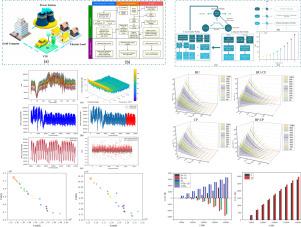基于博弈论的可持续发展的车联网经济分析
IF 7.1
2区 工程技术
Q1 ENERGY & FUELS
Sustainable Energy Technologies and Assessments
Pub Date : 2024-11-27
DOI:10.1016/j.seta.2024.104087
引用次数: 0
摘要
在基于协调博弈的车联网(V2G)调峰系统中,最终目标是在 V2G 运营中实现正的总净回报,同时确保所有利益相关者的利益达到平衡。本研究考察了比亚迪(Build Your Dreams)电动汽车在参与 V2G 调峰服务前后的成本和收益动态,包括电动汽车用户、电网公司和发电厂。赛前分析显示,发电厂在收入方面遥遥领先,大大超过了电动汽车用户,而电网公司的净收入则为负数。高峰负荷的增加加剧了电力公司的净亏损,对 V2G 的可持续发展构成了巨大挑战。然而,比赛结束后,电网公司和汽车用户通过经济手段结成了合作联盟,电网公司和发电厂通过共同努力提供了宝贵的数据支持。优化后的调峰和基本负荷发电成本差距缩小到优化前的 79%,碳排放量减少了 3.14%。此外,实施这一合作战略后,电网公司的损失最多可减少 9%,整个 V2G 调峰系统的净收入可增加 6.7%。因此,这一战略极大地促进了 V2G 业务的发展。本文章由计算机程序翻译,如有差异,请以英文原文为准。

Analysis of vehicle-to-grid economy based on sustainable development grounded in game theory
In a vehicle-to-grid (V2G) peaking system based on coordination games, ultimate goal realized a positive total net return in V2G operations, while ensuring that the interests of all stakeholders reached a balanced equilibrium. This study examined the cost and benefit dynamics of BYD (Build Your Dreams) electric vehicles, encompassing electric vehicle users, power grid companies, and power plants, before and after participating in V2G peak load balancing services. Pre-game analysis revealed that power plants led in terms of revenue, significantly surpassing electric vehicle users, whereas grid companies incurred negative net income. An increase in peak load exacerbated the power company’s net loss, posing a significant challenge to V2G’s sustainable development. However, post-game, a cooperative alliance between the power grid company and car users was forged through financial means, with the power grid company and power plants offering invaluable data support through collaborative efforts. The disparity between optimized peak and base load generation costs narrowed to 79% of pre-optimization levels, with a 3.14% reduction in carbon emissions. Furthermore, the implementation of this collaboration strategy can result in a maximum reduction of 9% in the power grid company’s losses and an enhancement of 6.7% in the net revenue of the entire V2G peak-shaving system. Consequently, this strategy significantly promotes the development of V2G operations.
求助全文
通过发布文献求助,成功后即可免费获取论文全文。
去求助
来源期刊

Sustainable Energy Technologies and Assessments
Energy-Renewable Energy, Sustainability and the Environment
CiteScore
12.70
自引率
12.50%
发文量
1091
期刊介绍:
Encouraging a transition to a sustainable energy future is imperative for our world. Technologies that enable this shift in various sectors like transportation, heating, and power systems are of utmost importance. Sustainable Energy Technologies and Assessments welcomes papers focusing on a range of aspects and levels of technological advancements in energy generation and utilization. The aim is to reduce the negative environmental impact associated with energy production and consumption, spanning from laboratory experiments to real-world applications in the commercial sector.
 求助内容:
求助内容: 应助结果提醒方式:
应助结果提醒方式:


